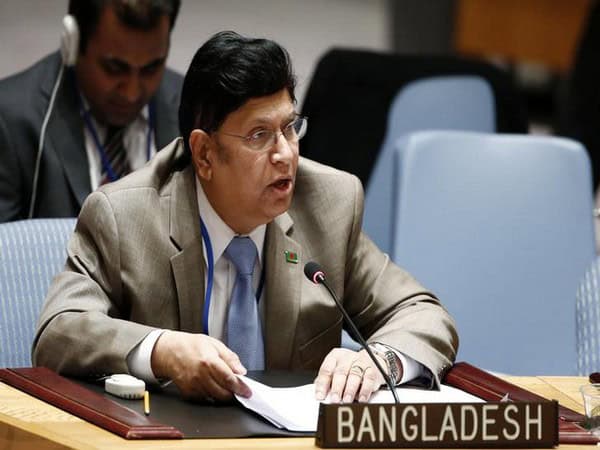Dhaka [Bangladesh]: The United Nation Security Council (UNSC) could not take any strong decision on the adaptation of a resolution on Rohingya issue due to lack of consensus among permanent members, Foreign Minister AK Abdul Momen has said.
Addressing the Parliament on Monday, Momen said that the UN bodies and other non-governmental organisations were not allowed to visit the northern Rakhine state, homeland of the displaced Muslim minorities, which is a big hurdle for creating a conducive situation for the repatriation of Rohingyas. As a result, Rohingyas are not interested in returning to their homeland, The Daily Star quoted the Foreign Minister as saying.
“Repatriation of Rohingyas is yet to begin although there are relentless efforts of United Nations and other international communities, as there are some challenges,” Momen said.
“There are strong diplomatic efforts for resolving Rohingya crisis at The United Nations Security Council, the United Nations General Assembly, the United Nations Human Rights Council, but UNSC was not able to take steps due to lack of consensus among permanent members,” he added.
Momen also stated that there is no alternative of continuing bilateral discussion with Myanmar for resolving the Rohingya crisis. “We can say from previous experience that Myanmar shows insincerity to implement bilateral arrangements in absence of pressure from the international community,” he said.
“So, it is necessary that international pressure is maintained through United Nations on Myanmar,” he added.
Meanwhile, a power blackout across nine conflict areas in townships of Rakhine and Chin States in Myanmar reportedly entered its fourth day on Monday, blocking villagers from accessing the internet in areas where the army is accused of initiating a crackdown on the ethnic minorities.
UN Special Rapporteur Yanghee Lee on Monday warned that the shutdown may risk serious implications for human rights and humanitarian monitoring.
She said, “The entire region is in a blackout,” adding, “I fear for all civilians there, cut off and without the necessary means to communicate with people inside and outside the area.”
On Thursday, Myanmar’s Ministry of Transport and Communications said that internet services were being used to coordinate illegal activities and ordered all mobile network providers under the Telecommunications Law of 2013, to temporarily cut mobile internet services.
Rohingyas have been forced to take shelter in Bangladesh’s Cox Bazaar after Myanmar’s army, responding to attacks by an armed group, launched a brutal campaign against the Muslim minorities in the Rakhine state in 2017.
Since then, more than 35,000 civilians have been displaced and dozens of civilians, including children, have been killed and injured by both indiscriminate and targeted attacks. Others, mainly ethnic Rakhine men, have died while in the military’s custody, according to the United Nations.
UN Deputy Spokesperson, Farhan Haq, told journalists in New York on Monday that the organisation continues to hope “that there will be conditions set that would allow for the peaceful return of the Rohingya to that state”, adding in relation to the internet blackout that “we want to make sure that freedom of opinion and freedom of expression is upheld”.
Myanmar regards Rohingya as illegal migrants from the Indian subcontinent and has confined tens of thousands to sprawling camps in Rakhine since violence swept the area in 2012.
The unrest prompted thousands of minorities to flee Myanmar by sea. The exodus peaked in 2015 when an estimated 25,000 people crossed the Andaman Sea for Thailand, Malaysia and Indonesia, many drowning in unsafe and overloaded boats.
[source_without_link]ANI[/source_without_link]

